'I will speak with my own voice': Nicola Sturgeon on party divisions, Alex Salmond and succession plans
This interview – a socially distanced sit-down in her blustery back garden – is supposed to mark the drawing of a line under the events of the last few years; one last reflection so the SNP leader can put the past behind her. But Alex Salmond has a knack for making everything about him; and so, as she greets me, one of the first words out of her mouth is “Alba”.
Sturgeon has seen some of the Alba press conference, and is not impressed with either the shonky technology or the performance of the new party leader.
Advertisement
Hide AdAdvertisement
Hide Ad“There are some people, and they do tend to be men, whose egos don’t allow them to exit the stage when the time is right for the sake of other people and, I would argue, for his own dignity,” she says.
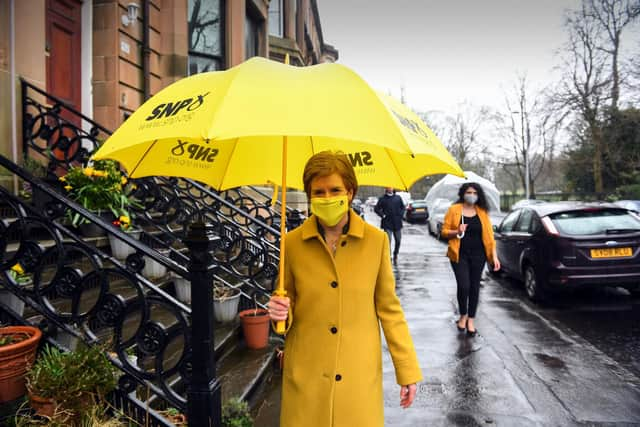

By now, Salmond has set out his Alba stall and introduced his first three candidates: former SNP group leader on Inverclyde council, Cynthia Guthrie, alongside fellow defectors Eva Comrie and Chris McEleny. McEleny, a vocal critic of Sturgeon’s perceived caution, is the driving force behind Plan B – the option of holding a referendum without the consent of Westminster.
Alba intends to field at least four candidates on each of the regional lists, with Salmond on the North-East list, the logic being that depriving the SNP of a majority and replacing it with an “independence supermajority” made up of a range of Yes-supporting parties is a better route to a second referendum.
Sturgeon describes the move as “the most predictable development in Scottish politics for a long time”, but is clearly furious. “Alex Salmond was acquitted of criminal wrongdoing, but, even if I just base this on what he told me, I know he didn’t always behave appropriately towards women, and he hasn’t shown in public a single sign of reflecting on that,” she says. “I suppose I harboured a hope that was different privately, but today’s antics shatter that hope.”
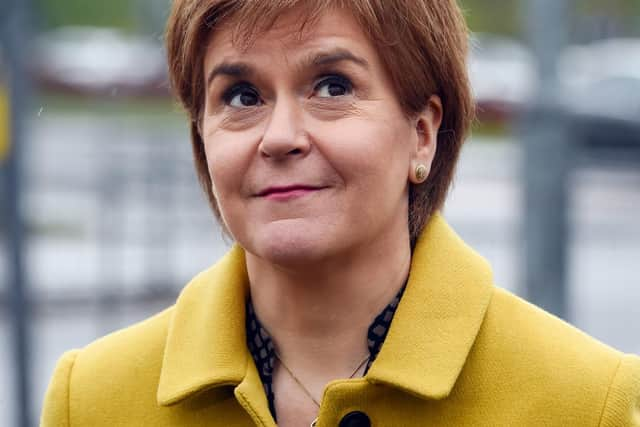

Salmond has continued not reflecting on his past behaviour. Later, when Channel 4 news presenter Krishnan Guru-Murthy pointed out his own QC had referred to him as a “sex pest” and a “bully”, Salmond said: “This isn’t true. My defence was the complaints against me were either fabrications or exaggerations and the important point is a jury, having heard all the evidence, acquitted me on all the charges.”
He added: “Most people in Scotland think it’s time to move on. I certainly want to move on to the issues that matter to men and women in Scotland, and that’s what Alba is going to do.”
Earlier in the day, Sturgeon had been out campaigning Covid-style: she had her photograph taken planting a tree in a community garden and thought frustratedly about the captive voters in the houses whose doors she was not allowed to chap.
“There are things that I, if I am re-elected as First Minister, have to put right, in terms of the things the Scottish Government got wrong, but in terms of any kind of psychodrama around Alex Salmond, I have moved on from this,” she says.
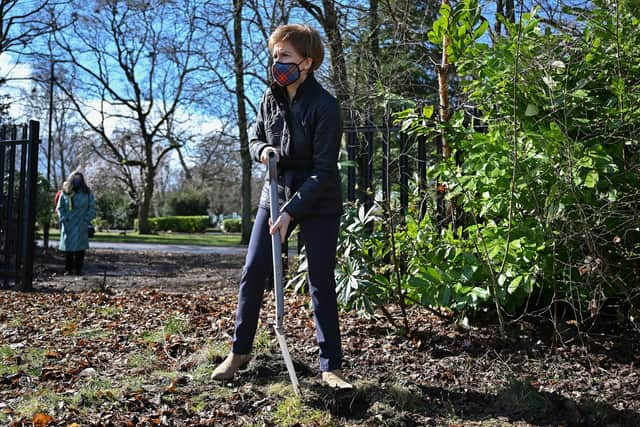

Advertisement
Hide AdAdvertisement
Hide Ad“One of the things that has irritated me, because it reduces the seriousness of what is being dealt with, is the description of this as a Salmond/Sturgeon row as if we had just had a fall-out about some political issues. I didn’t fall out with Alex Salmond. He was accused of really serious misconduct. I don’t think we should reduce it to some political disagreement.”
Yet the launch of Alba means that, for all their stated desire to put the past behind them, the former allies will once again be trapped in the narrative of a personal feud. For the six weeks of the election campaign, the headlines will continue to be framed in terms of their toxic rivalry, as Sturgeon is forced to fight enemies inside as well as outside the movement.
In the past, she has talked about the loss she felt as her relationship with her old friend broke down. “I struggled with that for a long time,” she says now. “I missed the man I thought he was and the relationship I thought we had.”
Now, she says his lack of contrition helped her process those feelings. “He has behaved in a way that has piled more suffering onto women who believed they had already suffered at his hands. Watching that, having my eyes opened to that, has helped me get over that sense of personal grief.”
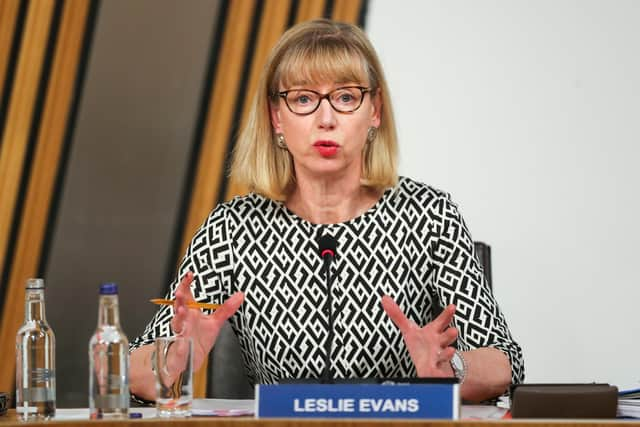

Doubtless, the complainers will have been watching. They will have heard the man they accused of sexual harassment talk about the importance of sex-based rights.
Knowing what she knows, does Sturgeon think her predecessor is fit to return to frontline politics? “Look, serious questions have been raised about the appropriateness of his behaviour towards women while he held the highest office in the land,” she says. “I think that raises real questions about the appropriateness of any return to public office.”
Sturgeon is talking to me at the end of a rollercoaster week – a week that could easily have marked the end of her six-plus years as First Minister.
On March 25, after a leak from the parliamentary inquiry revealed the committee believed she had misled them (and therefore Holyrood), she faced a barrage of disastrous front pages, opinion pieces and demands for her resignation. The following Monday, a report by James Hamilton QC, the former Director of Public Prosecutions in Ireland, cleared her of breaching the Ministerial Code. His ruling meant she easily survived the Scottish Conservatives’ vote of no confidence in Holyrood the next day.
Advertisement
Hide AdAdvertisement
Hide AdShivering in her fitted Barbour jacket, she rewinds the week. The previous Friday, she and her husband Peter Murrell – the SNP’s chief executive – were effectively imprisoned in their home as journalists and photographers massed on their lawn.
“I was under no illusions last weekend,” she says. “If James Hamilton had found I meaningfully breached the Ministerial Code, I would have resigned.
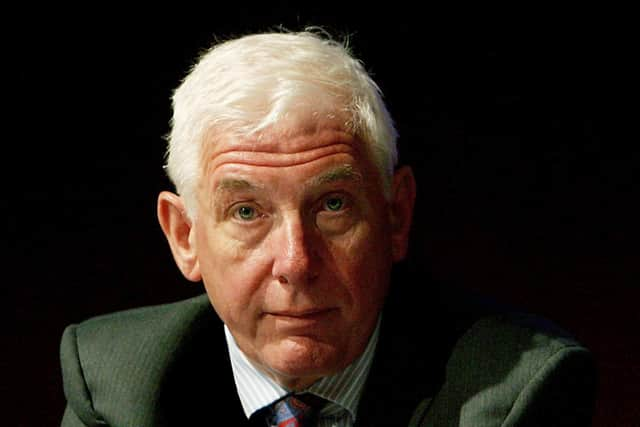

“I mean, I was always clear in my mind that I didn’t do those things, so I suppose I had faith that truth and justice would prevail. But, that was the conclusion I had come to. Had [it gone against me], I would have tendered my resignation on Tuesday because I have always believed that the office of First Minister is bigger than any individual, and I would not have dragged the office of First Minister through the mud.”
Sturgeon also believes the SNP is bigger than any individual. Yet she must have known how profoundly her resignation would have affected both the party and the movement. The public perception of her handling of the pandemic sent her approval ratings – and support for independence – soaring in the second half of last year, although they have dipped slightly since Christmas.
I put it to her that the SNP has no succession plan. At present, its electoral fortunes are synonymous with hers.
“I don’t believe that,” she says. “I know why people say that but I also remember the days when people used to look at Alex Salmond and say the same thing. There are worthy successors to me in the SNP. There may not be a single, obvious, automatic successor – someone everyone looks at and says it’s obviously them … but I look around my colleagues and there’s no shortage of people I think could be very good First Ministers.”
Asked to name names, she says: “It’s invidious for me to start doing it because a, I will exclude people and b, I will immediately put an arrow over them. But [finance secretary] Kate Forbes is an absolute powerhouse of a talent as a politician, and Humza Yousaf [justice secretary] is also incredibly talented, and that’s just two of many.”
In my head, I think about Forbes’s conservatism on equal marriage and abortion and Yousaf’s current travails with the Hate Crime Bill. “Really, in the short term?” I repeat.
Advertisement
Hide AdAdvertisement
Hide AdShe replies: “Don’t get me wrong – had I found myself this week no longer leader of the SNP I am not saying it wouldn’t have been a shock to the party, particularly on the brink of an election campaign. But it would have pulled through because it is bigger and stronger and deeper than just me. Cometh the hour, cometh the person. Someone would have stepped up.”
In the end there was no need. But the euphoria that was so palpable on Monday night was short-lived. Tuesday saw the publication of the parliamentary inquiry report, which was highly critical of the Scottish Government’s botching of its initial process and its approach to the judicial review which ruled it unlawful. It also concluded there was an “individual failing” on the part of Permanent Secretary Leslie Evans, who oversaw the investigation.
On Wednesday, Salmond announced plans to take legal action over the conduct of Evans and make a complaint to the police over the leak of the Scottish Government’s original inquiry report – which contained details of the allegations – to the Daily Record. Then on Friday, he launched his new party.
Later that evening, Action for Independence stood down its 42 candidates – announced just 12 hours earlier – in deference to Alba. And yesterday morning, MP Kenny MacAskill quit the SNP to join their ranks. Rumours MP Joanna Cherry, also a fierce critic, had followed suit turned out to be unfounded.
Yesterday’s front pages were dominated not by Sturgeon out campaigning but by the Alba launch. The stories were not all flattering – the Sun’s headline called him The Termineckor, while the Daily Record went with “Right on cue, he came in like a Wrecking Ball” – but his face was everywhere.
Then, there was the Independent’s splash, which read: “Work with New Party, Sturgeon told.” The story claimed two SNP MPs had called for the party leader to “bury the hatchet” and suggested Alba could offer a “dream ticket” under a proportional representation voting system.
It landed too late for me to ask Sturgeon what she made of it, but past experience allows me to make an informed guess: in placing the onus on her to make peace with a man who is constantly undermining her, it reeks of the kind of sexism she is wont to call out.
Most conversations with Sturgeon involve some discussion of misogyny, and this one is no different. Given the whole Salmond debacle was born out of those frenzied weeks after the Harvey Weinstein scandal, and came to a head earlier this month just as women who took to Clapham Common to mourn the murder of Sarah Everard were being huckled around by police, it was in the forefront of both our minds.
Advertisement
Hide AdAdvertisement
Hide AdIn between those watershed moments, the two women who made formal complaints against Salmond under the Scottish Government’s new complaints procedure found themselves failed, traduced and treated as pawns in a political game
Sturgeon says it was tough to watch Salmond weave a conspiracy out of messages of support they sent to one another, and between SNP officials. “I have kind of accepted what he [Salmond] wanted to chuck at me, for reasons that only he can explain,” she says. “I am big enough to deal with it. I have a voice of my own. But some of the people he has attacked, not [necessarily] directly, but allowing other people to do it for him, don’t have the ability to speak up and fight back.
“The complainers have had to listen to the accusations of being conspirators, and normal human behaviour being described as something it wasn’t. My husband has had those accusations levelled at him. I feel particularly aggrieved on behalf of Sue Ruddick [the SNP’s chief operating officer].”
Ruddick had no role in the complaints process, but was one of the four people Salmond accused of having been involved in a “concerted and deliberate effort” to prevent him from returning to frontline politics.
“Her name appears in the official report of the Scottish Parliament and Hansard in the House of Commons, courtesy of David Davis, as some kind of conspirator against Alex Salmond when she is not,” Sturgeon says.
“Her personal messages with people she was simply trying to support have been accessed and salivated over, and she has had to bear accusations that are completely without foundation. I have seen the deep personal impact that has had on her and I feel really angry. The parliamentary committee ultimately accepted that, but there is nothing in its report that undoes the damage that was done to her.”
The two complainers gave powerful testimony to the committee. They talked about the failure of the Scottish Government process; the way they were “dropped” after the judicial review, and the politicisation of the inquiry which left them feeling exploited.
This treatment has had repercussions not only for them, but for all women who, having witnessed their ordeal, may well conclude the costs of taking on powerful men are too high.
Advertisement
Hide AdAdvertisement
Hide AdDuring our interview, Sturgeon consistently acknowledges the failings of her own government and says, if re-elected, she will make sure it reflects on the criticisms of both the parliamentary inquiry and Laura Dunlop QC’s report on the existing process, taking them forward into its own reviews.
“If I am still First Minister after the election, then part of what I need to do to put things right is to make sure the government is asking itself the right questions and coming up with the right answers,” she says. “So much trust has to be rebuilt if we are to give women the confidence, not just that they will be listened to with the right intentions, but that there will then be a process that properly addresses the complaints they are raising.”
She says witnessing events here and in the wider world has given her an even stronger determination that “we have to make the world a safer place for women”, but also “a recognition that we have further to go to reach that than I thought we had”.
And yet, listening to her in her back garden, and more so when transcribing her comments later, it is impossible not to notice the deflections – the references to the Scottish Government’s “good intentions”, for example – that fill the cracks between the promises to act.
The only time her hackles rise comes when I point out that, despite admissions of failure, no-one has lost their job. There is a palpable cooling of tone when I ask why Evans has not resigned. “I am not going to sit here and discuss the employment of a civil servant who can’t speak back,” she says.
I try again. “Many people feel that it’s one thing for the government to say, ‘We made mistakes we will reflect on it’, but that no-one has been held accountable,” I say.
“The person responsible for this whole thing ultimately is the man who behaved in an inappropriate way,” Sturgeon replies. “The most important thing for the government is to put right what it got wrong.”
She has a habit of diverting difficult questions back to Salmond. “There are times I wonder if I feel more angst over his behaviour – behaviour that I didn’t know about at the time – than he does,” she says at one point. “Because I have tortured myself asking if I should have known about his behaviour? Could I have done anything?”
Advertisement
Hide AdAdvertisement
Hide AdSalmond’s re-emergence as a political contender marks the almost inevitable climax of a year of political machinations. Once, he was a gradualist like Sturgeon. But since his acquittal on all charges at his trial, he has gathered support from fringe fundamentalists including Stuart Campbell (Wings Over Scotland), former ambassador turned blogger Craig Murray and former editor-in-chief of Radio Sputnik, Mark Hirst. Campbell was one of the first to ask a question at Alba’s launch.
Some of those who have coalesced around Salmond have peddled the idea of the complainers as conspirators and Sturgeon as a member of the “wokerati”, whose adherence to progressive values – particularly on the Gender Recognition Reform Act – is eroding women’s rights.
Even within the mainstream party, there is friction on this issue, with MP Kirsty Blackman’s tweets on trans women and representation on boards attracting criticism from those with a more gender critical perspective inside and outside the SNP.
This acrimony has been amplified by opposition to the Hate Crime Bill, which does not include sex as an aggravator. Some critics have gone so far as to question Sturgeon’s feminism and suggest the SNP “hates women”.
Sturgeon insists claims of internecine war are exaggerated. “The SNP is pretty united,” she says. “Are there voices in the SNP who don’t like me and disagree with my approach to politics? Yes, although, as of today, there might be fewer of them than there were yesterday. But when people talk about division, they talk up this notion that there is a 50:50 split. That is rubbish. Opinion polls show that support for the leadership and the broad prospectus is 90 per cent-plus.”
As for the trans issue, she accepts it’s thorny. “I think society still has an issue with transphobia that needs to be tackled, and, equally, there are some concerns women have about the erosion of rights and attacks on rights,” she says. “I am a feminist to my fingertips. But, going back to Sarah Everard: the risk to women’s safety is abusive men and that’s what we have got to focus on, it’s not trans women.”
The question of whether Alba can inflict serious damage on the SNP is being hotly debated across the UK. For several weeks now, polls have been showing a dip in support that could deprive the party of its predicted majority. A large number of SNP supporters casting their list vote for Alba would heighten that prospect.
“If you want an SNP government, if you want the leadership the country needs right now, if you want a second independence referendum, if you want that prospect of a different, better future for Scotland, then both votes SNP is the only way to be sure of getting it,” Sturgeon says.
Advertisement
Hide AdAdvertisement
Hide Ad“The minute you start playing games with the electoral system, that’s when you start to jeopardise it. The person who used to be the advocate of that was Alex Salmond.
“What was the difference between the SNP getting a majority in 2011 and just not getting a majority in 2016? It was that in 2016 we had a bigger gap between our constituency and our list vote.”
On the plus side, however, Alba could provide a refuge for many of the destabilising elements within the SNP. Yesterday Ian Blackford, SNP leader at Westminster, described MacAskill’s defection as “something of a relief”.
Sturgeon says: “The good thing about [Salmond] now having his own party is I don’t have to spend much time talking about him or thinking about him any more.
“I am the leader of the SNP. I am going to lead a positive campaign. We are in the biggest crisis of our lifetime. The country needs to decide who it trusts to steer us through that crisis, and then we need to ask ourselves big, positive questions about the kind of recovery we want and how best to bring it about.
“Others can speak for themselves. I will speak with my own voice.”
Comments
Want to join the conversation? Please or to comment on this article.